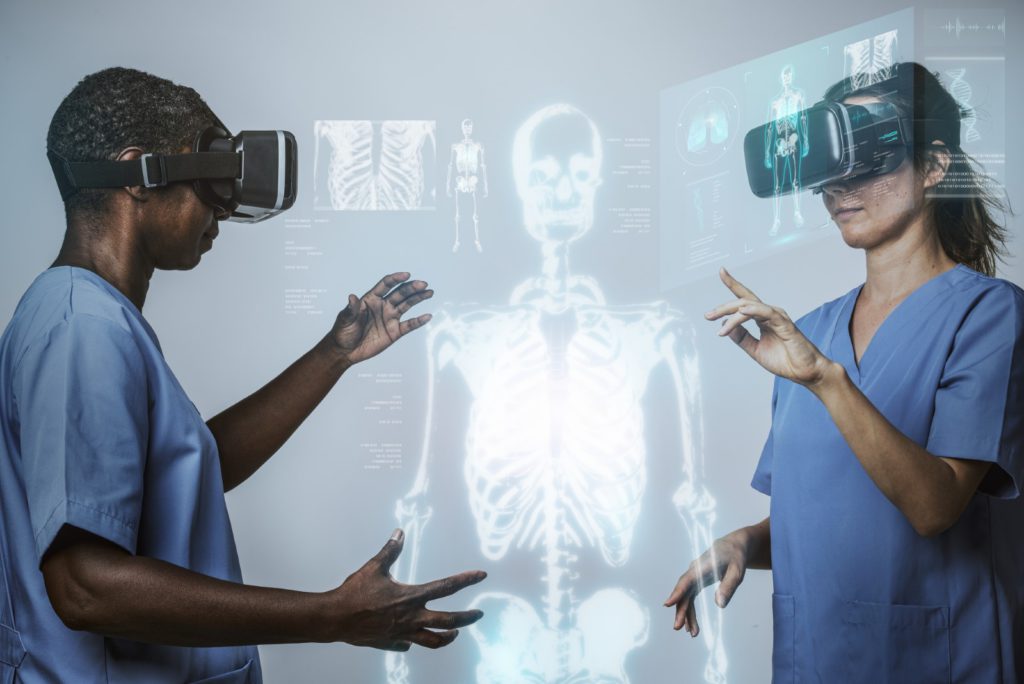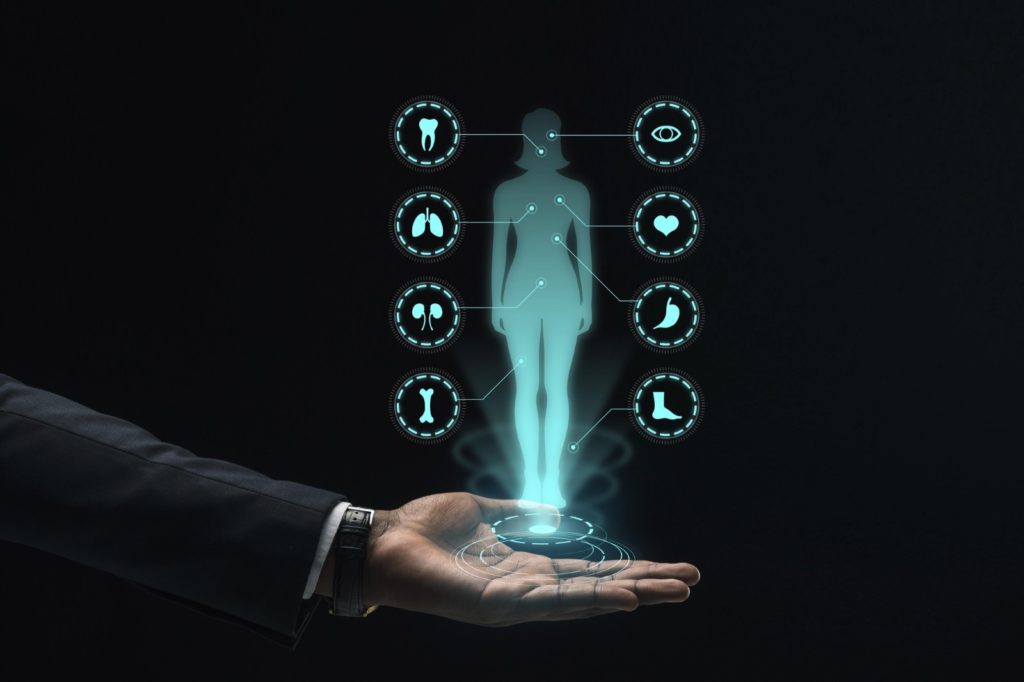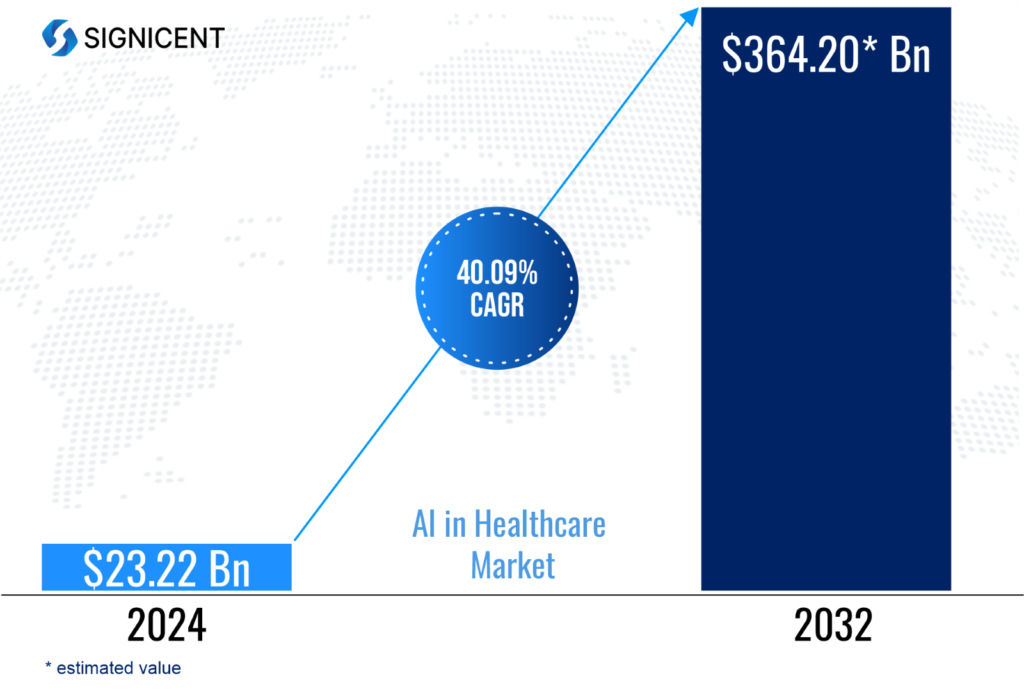Visualize a future where proactive therapy is given before symptoms even start, misdiagnoses are uncommon, and therapies can be adjusted with accuracy. Artificial Intelligence (AI) is turning this vision into reality, fundamentally transforming the global healthcare sector.
However, our current healthcare systems face challenges like delayed diagnoses, administrative burdens, insufficient personalization in treatment, and high operational costs. These issues have long hindered the efficiency and quality of medical care. As AI steps in, it promises solutions that not only ease these burdens but also create opportunities for better health outcomes, cost-efficiency, and optimized medical workflows.
With real-time data analysis, intelligent automation, and predictive modeling, AI is rapidly becoming the backbone of next-gen healthcare. In this blog, we analyze how AI is changing the medical landscape through Technology Landscape Analysis, driving innovation across the entire health care system.
Nanobots in Bloodstreams: The Next Leap in Smart Patient Care
Alongside AI, nanobots are emerging as one of the most groundbreaking innovations in healthcare. These microscopic machines, small enough to navigate human bloodstreams, are poised to change how we detect, treat, and monitor diseases at the cellular level.
How Nanobots Work in Blood Cells:
- Targeted Detection: Nanobots can identify specific biomarkers in blood cells, signaling infections, cancers, or abnormalities instantly.
- Real-Time Treatment: These bots can deliver drugs directly to affected cells, minimizing side effects and enhancing efficiency.
- Clot Removal: Certain nanobots are designed to break down clots or repair tissue damage from within blood vessels.
- Data Transmission: Nanobots can relay live health data to external devices, enabling constant monitoring without invasive procedures.

Future Impact of Nanobots on the Human Body:
- Preventive Healthcare Will Become Proactive – Detects diseases before symptoms arise, enabling timely intervention.
- Cell-Level Repair Becomes Possible – Damaged tissues and organs could be treated from inside without major surgery.
- Continuous Health Monitoring – No need for repeated check-ups; nanobots will keep sending updates.
- Drug Delivery Gets Smarter – Minimizes dosage, side effects, and improves precision.
- Bio-Security Concerns Will Rise – As nanobots collect internal data, privacy and ethical regulations must evolve.
- Cognitive Interfaces Could Advance – Nanobots may one day connect to neurons, aiding in mental health or neurodegenerative disorders.
How AI is Transforming Disease Management
From real-time diagnostics to predictive healthcare strategies, AI is reshaping disease management by enabling faster detection, smarter prevention, and personalized care like never before. Leveraging a thorough Patent Landscape Search helps innovators identify key technologies and emerging trends in this space, guiding strategic decisions and accelerating breakthroughs in healthcare solutions.
Present-Day Applications
- Medical Imaging
- AI detects anomalies in X-rays, CT scans, and MRIs faster than humans.
- Used to diagnose pneumonia, tuberculosis, and cancer with high accuracy.
- EHR Analysis
- Identifies hidden patterns in Electronic Health Records to predict disease onset.
- Enables preventive care for diabetes, heart conditions, and chronic illnesses.
- Remote Patient Monitoring
- Wearable sensors track vitals and glucose levels in real time.
- AI interprets the data and alerts physicians for timely interventions.

Future-Driven Possibilities
AI is paving the way for futuristic healthcare—where digital replicas, genomic insights, and predictive models revolutionize treatment accuracy, disease prevention, and population-wide health forecasting.
Below are the future possibilities that will impact tomorrow’s care landscape.
- Digital Twins: AI-based replicas of patients for simulation and testing treatment strategies.
- Personalized Oncology: AI recommends cancer treatments based on a person’s genetic data and tumor type.
- Predictive Models: Forecast outbreaks and epidemics by analyzing environmental and social data.
The Tech Behind De-Extinction of Dire Wolves & Its Role in Healthcare
Rewriting DNA with Precision
The technology used to bring back extinct species like dire wolves involves CRISPR gene-editing and AI-assisted genomics. The same methodology is now revolutionizing personalized medicine in healthcare.
- AI interprets massive genomic datasets
- Identifies disease-causing mutations
- Helps design gene therapies for rare diseases
Healthcare Implications
- Rare Disease Treatment: Conditions previously deemed untreatable are now manageable through AI-powered gene editing.
- Cancer Genomics: Tailoring therapies based on tumor genetics leads to higher survival rates.
- Neurogenomics: Understanding brain disorders through AI-led mapping of neuronal gene expressions.

Key Challenges in AI-Driven Healthcare Systems
Below are the major drawbacks that healthcare faced before AI—delayed diagnosis, generic treatments, fragmented records, limited specialist access, clinician fatigue, and reactive disease management. Just like healthcare requires precise Patent Invalidity Analysis to identify and eliminate weak patents, AI helps transform healthcare by detecting flaws early, enabling targeted treatments, and improving patient outcomes.
- Delayed Diagnoses: Doctors relied solely on symptoms and imaging, often missing early signs of disease progression or rare disorders.
- One-Size-Fits-All Treatments: Medical protocols weren’t tailored to individual genetics, reducing effectiveness in complex or unique patient cases.
- Manual Record Systems: Disconnected files and paperwork led to incomplete patient views, delayed care, and duplicated efforts.
- Unequal Access to Specialists: Rural patients had limited specialist care, resulting in lower-quality treatment and poor health outcomes.
- Clinical Decision Fatigue: Physicians overwhelmed by unstructured data often faced burnout and struggled with accurate, timely decisions.
- Reactive Disease Management: Health systems waited for outbreaks before responding, lacking predictive tools to plan preventive strategies.
Innovations Driving AI in Healthcare
These smart technologies are becoming more popular as artificial intelligence transforms healthcare by improving treatment, cutting waste, lowering mistakes, and promoting sustainable, patient-first systems for the future.
Medical Imaging
AI accurately analyzes X-rays and CT scans, improving diagnosis speed and accuracy for diseases like pneumonia and tuberculosis.
- Detects lung nodules, reducing missed cancerous growths
- Identifies osteoporosis and bone loss in X-rays
Personalized Treatment
By analyzing genomic data, integrating patient information, and using predictive analytics, AI enables customized treatment plans.
- Considers genetic makeup, lifestyle, and medical history
- Enhances efficacy and minimizes side effects
- Adjusts dosages and predicts potential complications
EHR (Electronic Health Record) Analysis
AI analyzes EHR data to identify patterns and trends, predict disease risks, and enable personalized prevention strategies.
- Forecasts risks such as diabetes or heart disease
- Prevents adverse drug reactions through medication pattern analysis
Fraud Detection
AI detects irregularities by scrutinizing large healthcare data sets.
- Identifies overbilling and unnecessary procedures
- Flags potentially fraudulent claims, ensuring proper resource allocation
Remote Patient Care
AI-powered systems deliver healthcare services remotely, improving accessibility and responsiveness.
- Supports real-time health monitoring via wearables
- Enables swift treatment plan adjustments for conditions like diabetes

Efficient Medical Documentation
Using AI algorithms and Natural Language Processing (NLP), medical dictation is automatically transcribed into structured EHRs.
- Understands medical terms and context
- Saves time and enhances accuracy
- Suggests diagnoses and facilitates billing
Enhanced Medical Records Management
AI automates data entry, categorization, and analysis.
- Ensures accurate, secure, and compliant record-keeping
- Optimizes data organization and retrieval
- Reduces administrative workload
Clinical Decision-Making Support
AI analyzes vast datasets to guide healthcare professionals in diagnosing and treating patients.
- Integrates lab results, records, and imaging data
- Assists in identifying patterns and outcomes
- Adapts with time for improved decision-making
Improved Patient Care
AI-driven systems offer innovative functions such as assisted diagnosis, real-time prioritization, and personalized medications.
- Enhances patient outcomes
- Minimizes errors and boosts efficiency
- Optimizes population health management through actionable insights

Next-Gen AI Applications
- Natural Language Processing (NLP): Converts physician speech into structured medical documentation.
- Computer Vision: AI interprets visual inputs from medical images for diagnoses.
- AI Chatbots: Offer 24/7 virtual health assistance and triage support.
- Smart Wearables: Collect and analyze physiological data to detect early symptoms.
- AI in Surgery: Robotic arms guided by AI improve surgical accuracy and reduce complications.
These innovations are under steady progress and are expected to gain widespread traction across hospitals and research labs globally by 2027 and beyond. Conducting a thorough Technology Gap Analysis helps identify unmet needs and emerging opportunities, ensuring these advancements address critical challenges effectively.
Benefits and Major Impact on the Healthcare Sector
AI is changing healthcare in many ways; its advantages go beyond just efficiency to include smarter treatment, life-saving capabilities, and a more inclusive, accessible, and precision-driven future by 2027.
- Faster Diagnosis: Reduces waiting time and ensures early treatment.
- Cost Reduction: Automates administrative processes, saving billions annually.
- Personalized Therapies: Custom treatment plans reduce trial-and-error in prescriptions.
- Better Patient Outcomes: Data-backed decisions minimize errors and improve care.
- Scalable Healthcare: AI fills gaps in remote or resource-limited regions.
With AI, healthcare is moving toward precision, personalization, and proactiveness.
Global AI in Healthcare Market Trends
The AI in healthcare market is experiencing accelerated growth, driven by rising demand for precision medicine, increasing workloads on healthcare professionals, and technological breakthroughs in machine learning, imaging, and predictive analytics. Hospitals, diagnostic labs, and pharmaceutical firms are actively integrating AI for faster diagnoses, personalized treatment, operational efficiency, and real-time decision-making. Regulatory support and the growing availability of healthcare data further fuel this transformation across global healthcare systems.
As per Signicent Market Research, the values above are reflected in the graph below, showcasing regional adoption trends, investment growth, and AI integration across medical applications—from radiology and drug discovery to patient monitoring and administrative automation.

Key Players & Regional Insights
Global giants and disruptors are reshaping healthcare in each region driving AI adoption through unique innovation, needs, and policies. A thorough Market Assessment and Valuation helps identify these growth opportunities and quantify their potential impact. Here’s how top players are leading the AI-healthcare revolution:
Key Players in AI Healthcare
- IBM Watson Health: Cognitive computing for diagnosis and research
- Google DeepMind: Predicts acute kidney injuries and eye diseases
- Siemens Healthineers: AI-powered diagnostic imaging and analytics
- GE Healthcare: Intelligent platforms for radiology and surgery
- Philips Healthcare: AI integration in diagnostics and treatment planning
- Tempus: Precision oncology and genomic data solutions
Regional Contributions
- North America: Largest share due to tech infrastructure and R&D investments
- Europe: Focused on ethical AI and regulatory frameworks
- Asia-Pacific: Rapid adoption in countries like China and India due to population needs
Signicent supports healthcare businesses by providing detailed technological landscape studies that focus on AI-driven medical tools and solutions. We use patent analytics to identify innovation gaps and white spaces, allowing clients to make more educated R&D and IP decisions. We also aggressively scout emerging AI firms, uncover licensing opportunities, and evaluate technology to help our clients stay ahead of the curve in a rapidly changing sector.
In addition, our team delivers regulatory intelligence and Freedom To Operate (FTO) assessments to help companies enter global markets smoothly, tackling compliance difficulties across various regions. We also provide competitive benchmarking and strategic reports to drive product positioning, pricing, and growth strategies. With Signicent’s insights, healthcare organizations can navigate the AI revolution with precision, confidence, and innovative strategies.
Future Outlook
AI’s role in healthcare is fast evolving, from self-driving surgical robots and emotion AI to blockchain-powered data security and AI-driven medication development. These advancements offer faster, safer, and more personalized care while also improving worldwide interoperability among healthcare systems.
As the sector evolves, AI is altering not only how care is delivered, but also what is conceivable. Healthcare organisations that implement AI early will benefit from lower costs, better patient outcomes, and improved operational efficiency. The future of healthcare is not about replacing professionals, but about empowering them. With AI, care becomes more intelligent, efficient, and human-centered than ever before, ushering in a truly transformative era.
About Signicent LLP
We assist businesses globally in their technology innovations, R&D, new product development, patents, valuation, product commercialization & market research needs.
Services Offered:
- Patent Landscape
- Patent Portfolio Analysis
- Patent Invalidity Search
- Patent Licensing Services
- Freedom to operate (FTO)
- Chemical Structure Search
- Design Patent Search
- Technology Scouting
- Technology Landscape Analysis
- Technology gap analysis
- Technology Intelligence
- Market Research
- Bio Sequence Search
Elevate your Innovation and Research with Signicent’s cutting-edge approach to assist you with Technology and Market related matters alongside the IP aspect of the analysis.


